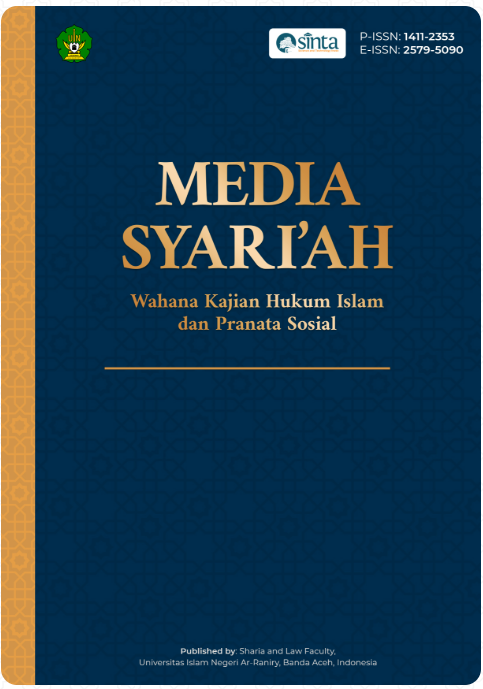Formal Acceptance of the Marriage Age Exception in the KUA Kluet Timur
DOI:
https://doi.org/10.22373/jms.v25i1.14006Keywords:
Early Marriage, Islamic Law, Compilation of Islamic LawAbstract
Early marriage is a controversial issue in East Kluet, South Aceh, making it a topic for all social groups. This article examines how the Office of Religious Affairs grants early marriage requests and how the Copying Regulations of Islamic Law affect early childhood marriage. How does Islamic law review early marriage? Discussing this thesis via field research. Primary and secondary data sources According to research, the Office of Religious Affairs makes early marriage simple by granting a letter of dispensation for the former requirements for religious courts for Muslims and district courts for non-Muslims. Second, for the benefit of the family and household, marriage can only be performed by the prospective bride and groom who have reached the age specified in Article 7 of Law Number 1 of 1974, namely the prospective husband. at least 19 and the potential wife at least 16. Third, in Islamic law, the imam of the school of law (conventional fiqih) allows marriage at an early age.
Pernikahan dini menjadi isu kontroversial di Kluet Timur, Aceh Selatan, sehingga menjadi perbincangan semua kalangan. Artikel ini mengkaji bagaimana Kantor Urusan Agama mengabulkan permohonan pernikahan usia dini dan bagaimana Undang-Undang Peniruan Hukum Islam mempengaruhi pernikahan anak usia dini. Bagaimana hukum Islam meninjau pernikahan dini? Membahas tesis ini melalui penelitian lapangan. Sumber data primer dan sekunder Menurut penelitian, Kantor Urusan Agama mempermudah pernikahan dini dengan memberikan surat dispensasi untuk persyaratan bekas Pengadilan Agama bagi umat Islam dan Pengadilan Negeri bagi non-Muslim. Kedua, untuk kepentingan keluarga dan rumah tangga, perkawinan hanya dapat dilakukan oleh calon mempelai yang telah mencapai umur yang ditentukan dalam Pasal 7 Undang-Undang Nomor 1 Tahun 1974, yaitu calon suami. minimal 19 tahun dan calon istri minimal 16 tahun. Ketiga, dalam hukum Islam, imam mazhab (fikih konvensional) membolehkan pernikahan di usia dini.
References
Abdurrahman. 1992. Kompilasi Hukum Islam Di Indonesia. Jakarta: Akademika Pressindo.
Arfa, Faisal Ananda, and Watni Marpaung. 2018. Metodologi Penelitian Hukum Islam. Jakarta: Kencana.
Aulia, Tim redaksi Nuansa. 2008. Kompilasi Hukum Islam. Bandung: Nusantara Aulia.
Ayyub, Syaikh Hasan. 2002. Fiqih Al-Usrh Al Muslimah. Kairo Mesir: Dar As-Salam.
Az-Zuhaili, Wahbah. 2011. Fikih Islam. Damaskus: Dar al-Fikr.
Bahreisy, Salam. n.d. Terjemahan Singkat Tafsir Ibnu Kasir. Surabaya: Bina Ilmu.
Ghazali, Abdul Rahman. 2003. Fiqh Munakahat. Jakarta: Kencana Prenada Grup.
Gunawan, I. 2015. METODE PENELITIAN KUALITATIF. http://fip.um.ac.id/wp-content/uploads/2015/12/3_Metpen-Kualitatif.pdf.
Hamka. 1983. Tafsir Al-Azhar. Jakarta: Pusaka Panji Mas.
Harmonis, Membagun Keluarga Yang. 2015. Tafsir Al-Quran Tematik. Jakarta: Aku Bisa.
Hawwas, Abul Aziz Muhammad Azzam dan Abdul Wahhab Sayyed. n.d. Fiqh Ibadah (Al-Wasiht Fiul Fiqhil Ibadah).
Kamaruddin, Marwan. 2013. Batas Usia Nafkah Anak Dalam Islam, Lembaga Naskah Aceh (NASA). Banda Aceh.
Kusuma, Hilman Hadi. 2007. Hukum Perkawinan Indonesia. Bandung: Mandar Maju.
Mardani. 2013. Hukum Islam Kumpulan Peraturan Tentang Hukum Islam Di Indonesia. Jakarta: Kencana Prenada Media Grup.
Mubarok, Jaih. 2002. Kaidah Fiqh Sejarah Dan Kaidah Asasi. Jakarta: Rajawali Pers.
Suryana, S. 2010. Metodologi Penelitian: Model Praktis Penelitian Kuantitatif Dan Kualitatif. https://simdos.unud.ac.id/uploads/file_penelitian_1_dir/23731890cdc8189968cf15105c651573.pdf.
Syarifuddin, Amir. 2006. Hukum Perkawinan Islam Di Indonesia Antara Fikih Munakahat Dan Undang-Undang Perkawinan. Jakarta: Kencana.
Wahbah, Al-Zuhaili. 1997. Al-Fiqh AlIslami Wa Adillatuh. I. Damaskus: Dar al-Fikr.
Yasin, M. Nur. 2008. Hukum Perkawinan Islam Sasak. Malang: UIN Malang Press.
Downloads
Published
Issue
Section
License
MEDIA SYARI'AH: Wahana Kajian Hukum Islam dan Pranata Sosial has CC-BY-SA or an equivalent license as the optimal license for the publication, distribution, use, and reuse of scholarly work. Authors who publish with this journal agree to the following terms:
1. Authors retain copyright and grant the journal right of first publication with the work simultaneously licensed under a Creative Commons Attribution-ShareAlike 4.0 International License that allows others to share the work with an acknowledgment of the work's authorship and initial publication in this journal.
2. Authors are able to enter into separate, additional contractual arrangements for the non-exclusive distribution of the journal's published version of the work (e.g., post it to an institutional repository or publish it in a book), with an acknowledgment of its initial publication in this journal.
3. Authors are permitted and encouraged to post their work online (e.g., in institutional repositories or on their website) prior to and during the submission process, as it can lead to productive exchanges, as well as earlier and greater citation of published work (See The Effect of Open Access).
You are free to:
Share — copy and redistribute the material in any medium or format.
Adapt — remix, transform, and build upon the material for any purpose, even commercially.
The licensor cannot revoke these freedoms as long as you follow the license terms.
All papers published in MEDIA SYARI'AH: Wahana Kajian Hukum Islam dan Pranata Sosial are licensed under a Creative Commons Attribution-ShareAlike 4.0 International License.




.png)


.png)
.png)
.png)



